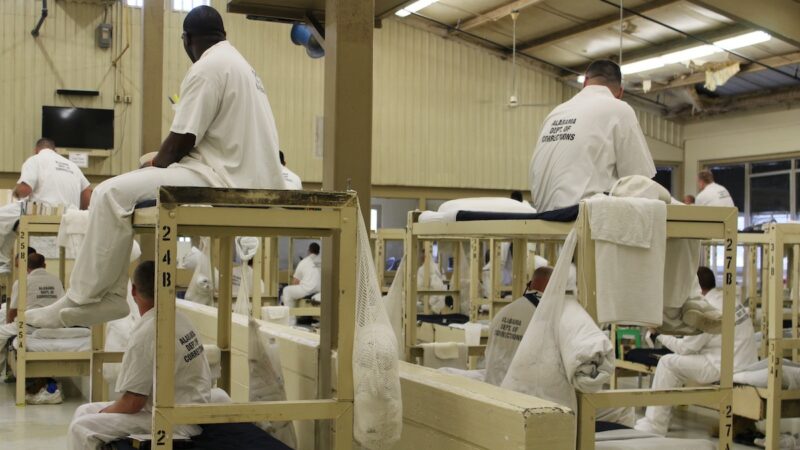Bill would give give non-violent, aging prisoners a chance at freedom
State Sen. Will Barfoot spoke before the Alabama Senate in March, pointing out a discrepancy between people being sentenced today versus before the year 2000.
“Under the Habitual Offenders Act, around 150 to 200 people were sentenced to life without parole and if that same crime occurred today, they would not have that same sentence,” Barfoot said.
Barfoot sponsored a bill known as the Second Chance Act. Should it be enacted, judges could review certain cases where an individual was sentenced to life without parole under the Habitual Offenders Act for potential resentencing.
To qualify to petition for a resentencing, an individual must have served at least 25 years in prison. Only people who have no violent crimes in their record and did not cause physical injury to a person can qualify. The proposed law expires in five years. Officials estimate a few hundred people might qualify.
“That sounds like a small number compared to how many people are currently incarcerated in the state of Alabama,” Elaine Burdeshaw, policy director with the Appleseed Center for Law and Justice said. “But these are people who will die in prison if there’s no pathway to relief for them.”
Appleseed is a group of lawyers and advocates for incarcerated people and their families.
“We’ve talked with a man whose mother is in her 80s,” Burdeshaw said. “She just wants her son to be released before she’s gone.”
After several failed attempts in previous legislative sessions, the bill has gained more support than ever before.
“It’s about redemption for people who’ve served their time,” Burdeshaw said. “But it’s also about shepherding state resources in a smarter way than on endless incarceration for people who are aging, who never physically injured anyone.”
The bill has undergone some changes thanks to people like Wanda Miller, executive director of Victims of Crime and Leniency, or VOCAL.
“How are we gonna make sure that these victims are notified in a timely manner so that they can either come to court or they could write a letter to the court?” Miller said.
The bill now includes a step-by-step process by which victims will be notified that their case is under review for potential resentencing.
Miller said victims often were in a courtroom 20 or 30 years ago when they first heard the sentence.
“The victim left the courtroom thinking ‘I don’t have to think about this again,’” Miller said. “They could move forward. They could heal from whatever trauma they had experienced.”
Miller added that victims of a crime have their choices taken away from them. But the additional language in the bill requiring victim notification helps restore those choices.
“We’re not saying that every victim should oppose resentencing,” Miller said. “We’re just saying every victim should be heard.”
But Miller said, after decades, victims might feel differently and some even advocate for release.
Burdeshaw with Appleseed says they have collaborated closely with victim advocacy organizations to ensure that victims do have a chance to weigh in.
“It’s not a get out of jail free card,” Burdeshaw said. “We don’t wanna lessen the fact that a crime was committed. And so we do want to ensure that victims’ voices are heard.”
The Second Chance Act has passed through the Senate. It is now awaiting to be heard on the House floor.
Auburn tabs USF’s Alex Golesh as its next coach, replacing Hugh Freeze on the Plains
The 41-year-old Golesh, who was born in Russia and moved to the United State at age 7, is signing a six-year contract that averages more than $7 million annually to replace Hugh Freeze. Freeze was fired in early November after failing to fix Auburn’s offensive issues in three seasons on the Plains.
Alabama Power seeks to delay rate hike for new gas plant amid outcry
The state’s largest utility has proposed delaying the rate increase from its purchase of a $622 million natural gas plant until 2028.
Former U.S. Sen. Doug Jones announces run for Alabama governor
Jones announced his campaign Monday afternoon, hours after filing campaign paperwork with the Secretary of State's Office. His gubernatorial bid could set up a rematch with U.S. Sen. Tommy Tuberville, the Republican who defeated Jones in 2020 and is now running for governor.
Scorching Saturdays: The rising heat threat inside football stadiums
Excessive heat and more frequent medical incidents in Southern college football stadiums could be a warning sign for universities across the country.
The Gulf States Newsroom is hiring an Audio Editor
The Gulf States Newsroom is hiring an Audio Editor to join our award-winning team covering important regional stories across Mississippi, Alabama and Louisiana.
Judge orders new Alabama Senate map after ruling found racial gerrymandering
U.S. District Judge Anna Manasco, appointed by President Donald Trump during his first term, issued the ruling Monday putting a new court-selected map in place for the 2026 and 2030 elections.









